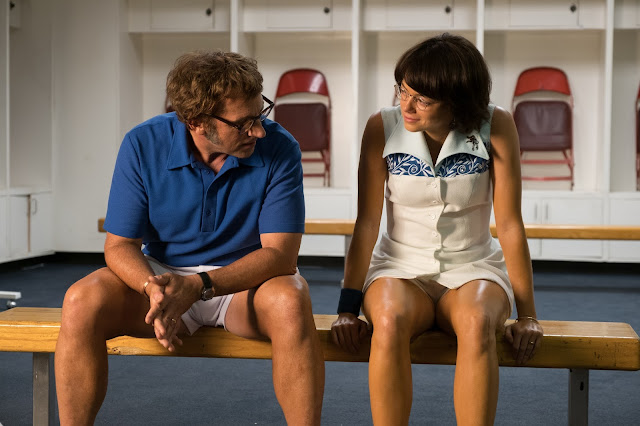WATCH THE TRAILER(S) HERE:
KEY CAST MEMBERS: Emma Stone, Steve Carell, Andrea Riseborough, Sarah Silverman, Bill Pullman, Austin Stowell, Elisabeth Shue, Jessica McNamee and Fred Armisen
WRITER(S): Simon Beaufoy
DIRECTOR(S): Jonathan Dayton and Valerie Feris
Meanwhile, while living off the glory of his days as a former champion tennis player, 55 year-old Bobby Riggs (Steve Carell) is trying to be a good husband to his wife Priscilla (Elisabeth Shue). Unfortunately, his old gambling demons are quite alive and well as is his desire to regain the spotlight. This, of course, leads him to dream up an idea that will be as much spectacle as it is sport: a “battle of the sexes” between the top women’s player in the world and himself.
What results, however, will be a battle that expands way beyond a simple tennis match.
SO, IS IT GOOD, BAD OR ABSOLUTELY AWFUL? Some biopics go through painstaking detail to explore every aspect of its subjects’ lives; some present the most-glossed over, slapdash/mediocre puff pieces that fail to capture what made their subject matter.
Battle of the Sexes is neither of those things; instead, it is a film that simply attempts to showcase some aspects of its two lead characters in great stylish detail while at the same time, humanizing them while being very selective in displaying judgment of their actions. It’s really an ingenious trick on the part of co-directors Jonathan Dayton and Valerie Feris; there are no over-the-top dramatics, there are no true villains as much as there are people representing the ideals of the time from a very understandable (given the times) mindset. Then again, Margaret Court hasn’t exactly softened her stance on King’s life in her advance years, Bennett and King had a very public struggle that’s left out of the film and Stowell’s level-headed, let-me-do-what’s-best-for-the-woman-I-love-despite-our-own-turmoil may not exactly have been as it plays out on screen.
Yes, the movie does take a few liberties with the actual facts, it does stick a mostly factual approach driven by a very up-to-the-task Stone. Stone captures King’s legendary competitiveness, shyness and desire to simply make things better for other women and Carell – who’s character almost becomes a tragic figure in a very Hollywood way before getting a very Hollywood moment at the end of the film – bring a great bit of levity to the whole scene as Riggs while Silverman is great as King’s tennis tour promoter/manager Gladys. (Think of a character fresh from The Carol Burnett Show or Rhoda living it up in sassy, glorious fashion while chain-smoking herself to death and you’ve got her character down pat.) Riseborough comes off as little more than a spacey, new-age chick that is everything King isn’t, but it plays well enough that it doesn’t feel as gimmicky/out-of-place as it might sound on paper. Throw in a “perfect for the current times even though the setting is the early 1970s” quote by a perfectly used Alan Cumming and the film hits enough beats to balance things out.
Perhaps one day, the balance King fought for won’t need a movie to remind the world of how far it’s come.


